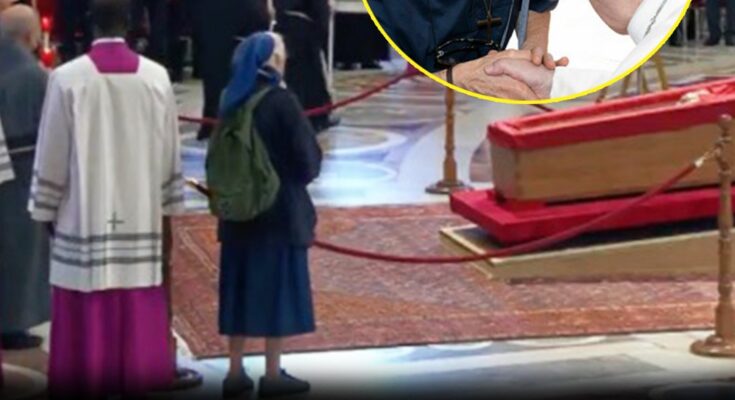In a moment that transcended tradition, one quiet act of devotion captured the attention of the world during the farewell to Pope Francis. On April 23, as thousands filled St. Peter’s Basilica to pay their final respects, an elderly nun quietly stepped out of line—not to defy protocol, but to honor a bond deeper than most ever knew.
Eighty-one-year-old Sister Geneviève Jeanningros wasn’t a dignitary, politician, or high-ranking cleric. She was simply a friend. Wearing a simple habit and a green backpack slung over her shoulder, she stood beside the late Pope’s casket, tears glistening in her eyes. In a crowd governed by strict Vatican order, her presence broke formation but spoke volumes of faith and love.
Pope Francis, born Jorge Mario Bergoglio, passed away on Easter Monday, April 21, at age 88, following a stroke. As more than 48,000 mourners filed past his coffin within the first 24 hours, Sister Jeanningros stood out—not for her status, but for her sincerity.
Her connection to the Pope stretched back more than 40 years, to when he was Archbishop of Buenos Aires. Both devoted themselves to serving those often overlooked—homeless individuals, circus performers, the terminally ill, and members of marginalized communities. Their shared mission became the foundation of a lifelong friendship rooted in humility and purpose.
Sister Jeanningros belongs to the Little Sisters of Jesus, an order known for living among the poor and the forgotten. For years, she and Sister Anna Amelia Giachetto have lived in a modest caravan on the outskirts of Rome. Every Wednesday, she would visit Pope Francis—sometimes bringing people from the streets along with her. The Pope always welcomed them with open arms, often inviting them to stay for lunch. Their relationship was not ceremonial, it was deeply human.
She is no stranger to grief. Her aunt, Léonie Duquet, was one of the many victims of Argentina’s brutal military dictatorship. Pope Francis, whose roots in Argentina connected him to that same era of pain, understood her loss intimately.
Some believed Sister Jeanningros had defied Vatican rules by stepping close to the coffin, but the truth was far more meaningful. The Vatican had quietly granted her special permission to say goodbye in her own way—an honor rarely extended, even to global leaders. Her unassuming appearance among the crowd hid a sacred truth: her presence wasn’t about protocol, it was about love.
Photos from their many shared moments reveal a warmth between them—laughing together at outdoor events, blessing a statue at a circus festival, sharing joy through their mutual belief in the dignity of all people.
Her final visit to the Vatican wasn’t routine—it was a farewell. One observer wrote, “She approached her friend the way she always did. Only this time, it was to say goodbye.”
In a Church often seen as rigid, Sister Jeanningros and Pope Francis represented something tender—compassion over convention, presence over performance. Her silent goodbye didn’t need a sermon. It needed only her presence.
And in that moment, as the world watched a frail nun stand beside one of the most influential leaders of our time, we were reminded that sometimes the most powerful goodbyes are spoken not with words, but with the heart.



